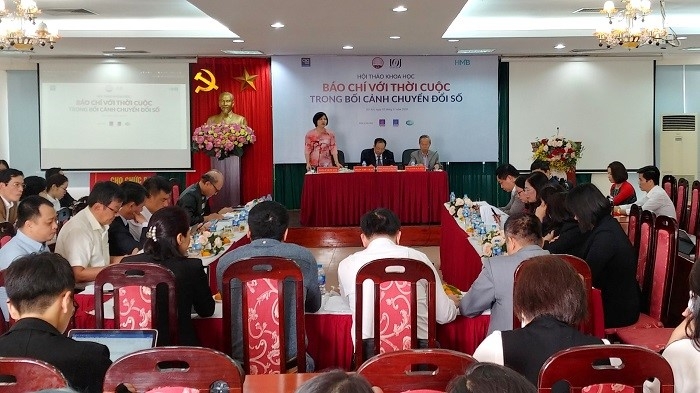
This is one among several topics that received high consensus during discussions at a symposium themed "Press with the new requirements in the context of digital transformation", organised by the Institute of Journalism and the Hanoi-based Academy of Journalism and Communication (AJC) on November 5.
Experts, leaders and managers from press and media agencies as well as journalists participated in discussions to build a basic foundation of journalism theory in the context of the modern digital transformation.
They also offered suggestions on how to solve problems in order to increase the competitiveness of the regular media with different types of social media in the current era, while discussing the expectations and adaptations agencies, organisations and businesses expect from the media to coordinate in the process.
Reports at the seminar showed a unified view on the urgent need for the media to make fundamental changes from its content creation, editorial modelling and human resources development to its vision, strategy, thinking and methods of leadership and management, in order to boost the core and pioneering role of the media in the cause of national construction and defence, especially in the present context.
According to Assoc. Prof., Dr. Do Thi Thu Hang, Director of the Institute of Journalism, the current digital revolution and Industry 4.0 both bring about both great opportunities for the media in terms of its transformation and development, as well as unprecedented challenges for the press in fulfilling its mission.
According to Hang, digital transformation is not simply the process of digitising, but moreover, building digital operating models, and more importantly, making the transition, in which the process of changing takes place comprehensively, from top leaders to all members of agencies, organisations and enterprises, in order to effectively operate.
Discussing this issue, participants at the workshop agreed that it is necessary to move towards the innovation models which focus on building the converged multimedia newsroom model at press agencies, such as in the media centre of Quang Ninh province or the multimedia model of the People's Army Newspaper, to operate effectively alongside the impacts of digital transformation.
In addition, in order for the converged model to work effectively, it is necessary to innovate in the organisation of production of journalism as well as communication products, in particular a strategy for training human resources to meet the practical requirements of the changing face of the journalism and media sectors.
Emphasising the human factor in the digital transformation of the press, Prof., Dr. Dinh Xuan Dung, from the Central Council for the Theory and Criticism of Literature, said that the most important thing is training, building and fostering a team of leaders, press managers and reporters with an adequate level of vision, ability and creativity to grasp digital transformation opportunities in time, leveraging this process and the modern technologies of the digital age to serve readers.
In addition, delegates at the seminar also proposed developing and completing the planning of a system of press agencies in Vietnam to meet current requirements in the context of the digital transformation, alongside solutions to improve both governance and innovative content, thereby helping perfect the converged newsroom model.
